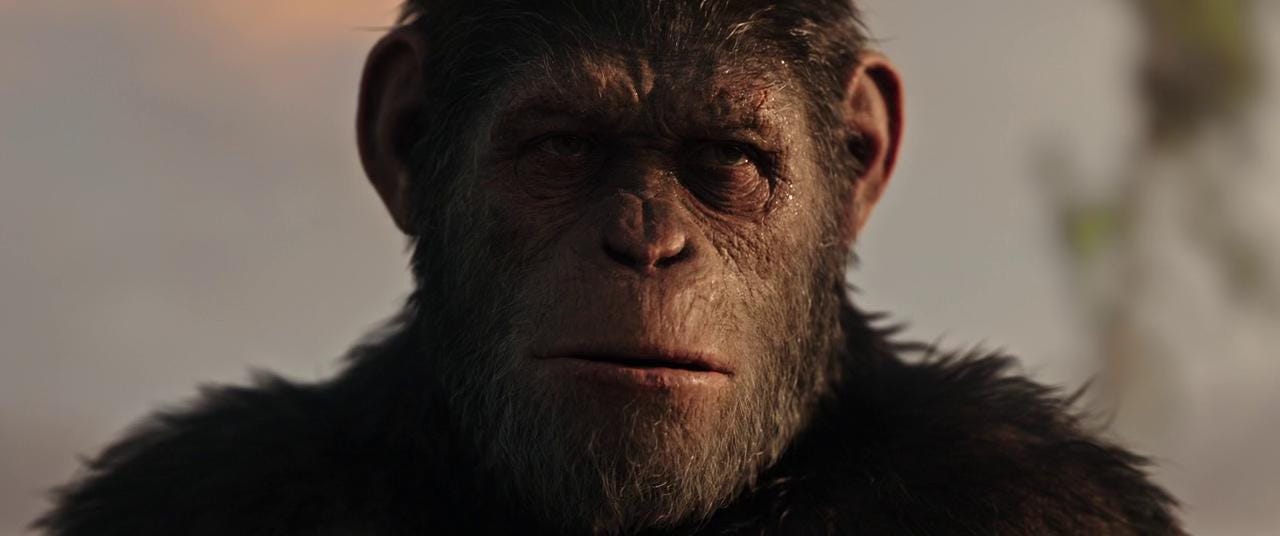Score for the Planet of the Apes
In the last few months, I’ve revisited the two most recent installments in the Planet of the Apes franchise: Dawn of the Planet of the Apes (2014) and War for the Planet of the Apes (2017), both directed by Matt Reeves. Though I don’t think either film quite rises to the level of greatness, I appreciate their somber mood, patient pacing, and lack of reliance on “action”; they are essentially dramas that happen to have blockbuster budgets.
I particularly admire Michael Giacchino’s grand, sweeping scores for both films. Giacchino is the man behind the Up theme that makes everyone cry with just a few notes, and a decade ago, I would have named him one of the best composers working in Hollywood. I think his work has fallen off somewhat in recent years, as he’s spread himself thin with a lot of Marvel and Pixar films that don’t provide much scope for his talents, but his collaborations with Matt Reeves still bring out the best in him (see: last year’s The Batman). As I was listening to his Planet of the Apes scores this week, I noticed that he was doing something really interesting with two of his main motifs.
One of the major motifs that recurs in both Dawn and War is a kind of ascending theme, which can be heard in the track “Primates for Life” below (starting at 4:35). The notes keep going up and up, creating a sense of stark, rising triumph. I think we could hear this musical theme as an expression of the main theme of the series: apes becoming rational, rising above the level of mere beasts and ascending to the level of man.
War introduces a new descending motif, as heard in “Exodus Wounds” (0:00-2:44) below, which is a kind of inverse: the notes keep going down and down, evoking a mournful feeling. This inverted theme could correspond to an inversion in the plot. In War, even as apes are ascending to the level of humans, humans are descending to the level of animals because of a disease that strips them of their rationality (most pointedly, they are losing their ability to speak).
I think this descending musical motif is linked not only to the descent of humanity, but also to the internal conflict of Caesar, the films’ hero. Early in War, a human Colonel raids Caesar’s home base and kills his wife and son. Caesar then embarks on a mission of reprisal, intending to raid the Colonel’s base and kill him. The dramatic question of the film is whether Caesar will rise to the level of rationality that humans have abandoned or lower himself to the subhuman level of the Colonel by allowing himself to be dominated by his animal urges.
Caesar ultimately chooses not to kill the Colonel when presented with the opportunity. He chooses the higher path, the truly human path, mastering his lower impulses instead of being mastered by them. However, he is shot during the escape from the Colonel’s base, and he later succumbs to his wounds after leading the apes to their new home. Like Moses, Caesar leads his people to a promised land that he cannot enter himself because of a moral failure. (If Caesar had not lingered to try and kill the Colonel, he would not have received his fatal wound.) What Giacchino does with his score for Caesar’s death scene is remarkable. Listen to the section in the track “Paradise Found” that begins at 4:19:
As Caesar dies, Giacchino overlays the ascending and descending motifs on each other, creating a richly contradictory sense of pathos. Caesar’s death is an ascent insofar as he achieves (like his Roman namesake) a kind of apotheosis, becoming immortal in the memory of the apes who will honor him after he dies. He has risen above his animal nature, overcoming his instinctual rage and becoming a rational leader. And yet, in the same moment, Caesar’s animal nature finally overcomes him, for it is the nature of an animal to die and be no more. His death is a descent, inevitable as gravity.


